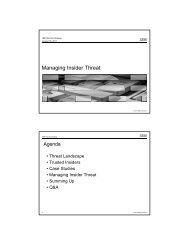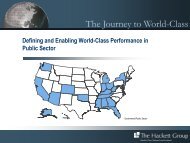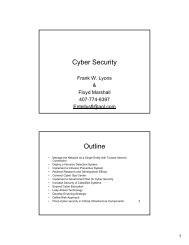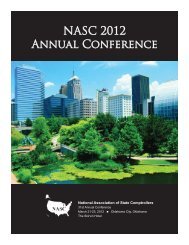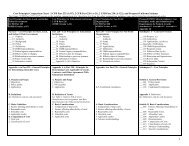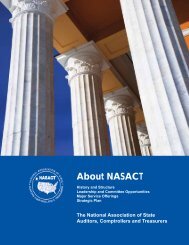Advisory Committee on Tax Exempt and Government Entities (ACT ...
Advisory Committee on Tax Exempt and Government Entities (ACT ...
Advisory Committee on Tax Exempt and Government Entities (ACT ...
You also want an ePaper? Increase the reach of your titles
YUMPU automatically turns print PDFs into web optimized ePapers that Google loves.
The Appropriate Role Of The Internal Revenue Service With Respect To <strong>Tax</strong>-<strong>Exempt</strong> Organizati<strong>on</strong> Good Governance IssuesSecti<strong>on</strong> 4958 100 imposes an intermediate sancti<strong>on</strong>, short of revocati<strong>on</strong>, where adisqualified pers<strong>on</strong> enters into a transacti<strong>on</strong> or receives compensati<strong>on</strong> from anorganizati<strong>on</strong> described in secti<strong>on</strong>s 501(c)(3) or (c)(4) that results in the insider receivingmore than fair market value. In order to encourage the governing board of anorganizati<strong>on</strong> to more vigilantly oversee such transacti<strong>on</strong>s, C<strong>on</strong>gress m<strong>and</strong>ated arebuttable presumpti<strong>on</strong> of reas<strong>on</strong>ableness, set forth in Treasury Regulati<strong>on</strong> secti<strong>on</strong>53.4958-6, pursuant to which an organizati<strong>on</strong> may create a rebuttable presumpti<strong>on</strong> thata transacti<strong>on</strong> is not an excess benefit transacti<strong>on</strong> if it follows the following three-stepprocedure: 101• The transacti<strong>on</strong> is “approved in advance by an authorized body of theapplicable tax exempt organizati<strong>on</strong>. . .composed entirely of individuals whodo not have a c<strong>on</strong>flict of interest.”• The “authorized body obtained <strong>and</strong> relied up<strong>on</strong> appropriate data as tocomparability prior to making its determinati<strong>on</strong>.”• The “authorized body adequately documented the basis for its determinati<strong>on</strong>c<strong>on</strong>currently with making that determinati<strong>on</strong>.”Under Treasury Regulati<strong>on</strong> secti<strong>on</strong> 53.4958-6(b), if a transacti<strong>on</strong> satisfies this threestepprocess, the IRS may rebut the presumpti<strong>on</strong> that arises to find an excess benefittransacti<strong>on</strong> <strong>on</strong>ly if it produces “c<strong>on</strong>trary evidence to rebut the probative value of thecomparability data relied up<strong>on</strong> by the authorized body.” 102 The rebuttable presumpti<strong>on</strong>is a unique provisi<strong>on</strong> because C<strong>on</strong>gress specifically found that organizati<strong>on</strong>s are morelikely to make better decisi<strong>on</strong>s about the fairness of insider compensati<strong>on</strong> <strong>and</strong> thefairness of certain transacti<strong>on</strong>s between the organizati<strong>on</strong> <strong>and</strong> insiders if they follow thethree specified governance procedures.C<strong>on</strong>gress also has determined that Forms 1023 <strong>and</strong> 990 should be publicly available.In stark c<strong>on</strong>trast to the strict c<strong>on</strong>fidentiality rules governing other tax returninformati<strong>on</strong>, 103 certain tax return informati<strong>on</strong> of charities has been available for publicinspecti<strong>on</strong> since 1950. 104 The purpose of requiring tax-exempt organizati<strong>on</strong>s to fileinformati<strong>on</strong> returns <strong>and</strong> to make those informati<strong>on</strong> returns publicly available is topromote tax compliance through transparency <strong>and</strong> accountability, <strong>and</strong> to enable the100141 C<strong>on</strong>g. Rec. E1765 (Sept. 12, 1995). An excess benefit transacti<strong>on</strong> is a n<strong>on</strong>-fair market value transacti<strong>on</strong> in which adisqualified pers<strong>on</strong> pays less than fair market value to the exempt organizati<strong>on</strong> or charges the exempt organizati<strong>on</strong> more than fairmarket value; or an unreas<strong>on</strong>able compensati<strong>on</strong> transacti<strong>on</strong> in which a disqualified pers<strong>on</strong> receives compensati<strong>on</strong> in excess of fairmarket value. In additi<strong>on</strong>, <strong>on</strong>ce regulati<strong>on</strong>s are issued, a proscribed revenue sharing transacti<strong>on</strong> also will c<strong>on</strong>stitute an excessbenefit transacti<strong>on</strong>.101Treas. Reg. § 53.4958-6(a).102Treas. Reg. § 53.4958-6(b). H.R. Rep. No. 104-506, at 57 (1996) (“If these three criteria are satisfied, penalty excise taxes couldbe imposed . . . <strong>on</strong>ly if the IRS develops sufficient c<strong>on</strong>trary evidence to rebut the probative value of the evidence put forth by theparties to the transacti<strong>on</strong> (e.g., the IRS could establish that the compensati<strong>on</strong> data relied up<strong>on</strong> by the parties was not for functi<strong>on</strong>allycomparable positi<strong>on</strong>s or that the disqualified pers<strong>on</strong>, in fact, did not substantially perform the resp<strong>on</strong>sibilities of such positi<strong>on</strong>.)”).103The unauthorized disclosure of tax return informati<strong>on</strong> by IRS is a fel<strong>on</strong>y under Secti<strong>on</strong> 6103. These same sancti<strong>on</strong>s apply toother governmental authorities <strong>and</strong> c<strong>on</strong>tractors who are authorized to receive tax return informati<strong>on</strong> from the IRS.104See Appendix 4 for a history of public disclosure. See also discussi<strong>on</strong>, supra, notes 93-97 <strong>and</strong> 104-06 <strong>and</strong> accompanying text.ADVISORY COMMITTEE ON TAX EXEMPT AND GOVERNMENT ENTITIES (<strong>ACT</strong>) June 11, 2008 30






